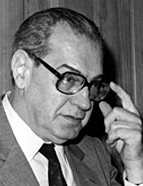

Raymundo Faoro was born in Vacaria, a small town in the countryside of Rio Grande do Sul. He was the son of Italian farmers and immigrants Attilio Faoro and Luisa D'Ambros. As a child, he moved to the city of Caçador, Santa Catarina, where he began his studies and attended secondary school at Colégio Aurora [Aurora College]. He returned to his home state to study at the University of Rio Grande do Sul (URGS), graduating in Law in 1948. During this period, he was one of the co-founders of the magazine Quixote. In the early 1950s, he moved to Rio de Janeiro, where he worked as a lawyer. In 1963 he passed a civil service examination to became state prosecutor, a position from which he would retire some years later. Raymundo Faoro was the author of few works. He wrote his first and most important book, Os donos do poder: formação do patronato brasileiro [The owners of power: the formation of the Brazilian body of employers] in 1958, which was published by Globo from Rio Grande do Sul. Despite winning the José Veríssimo Prize awarded by the Academia Brasileira de Letras (ABL) [Brazilian Academy of Letters], the book had little echo at the time of its release, most likely due to the political and intellectual context of those years which was characterised by a widespread national-expansionist belief in the role of the state in all economic and social issues — which contrasted with the fundamental theses of Os donos do poder , the interpretation of which sought to emphasise the suffocating control the state had over society.
With the 1970s came a significant change in the way Faoro's work was received. By then, it was recognised as one of the most important interpretations of Brazil. The authoritarian political scenario led by the military contributed to this sudden shift, since Os donos do poder seemed to shed some light on the actions of the armed forces — one of the sectors that made up the bureaucratic estate according to Faoro. The context had changed and so had the very structure of the work, which was reissued in 1975 with considerable revisions which tripled its size — from 270 to around 750 pages — including annotations that went from 140 to 1335 pages — and quotations added from German sociological references taken directly from the original, which had previously been taken from Spanish editions — and adding two more chapters. Despite this change in form, Faoro states in the preface to the second edition that the fundamental theses remained the same, having however been adapted to the style and requirements of current times.
This work is financed by national funds through FCT - Foundation for Science and Technology, I.P, in the scope of the projects UIDB/04311/2020 and UIDP/04311/2020.
